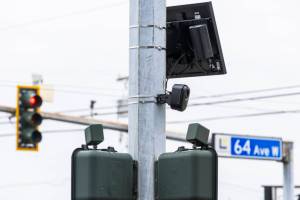No profit in empty nets
Published 9:00 pm Monday, October 23, 2006
POSSESSION SOUND – It’s barely after 6 a.m. on a recent Monday and Mike Borovina has joined Everett’s southbound commute.
The commuter train to Seattle running along the coast line near Mukilteo to his left soon leaves him far behind. Borovina is driving his own vehicle – the 56-foot purse seiner Sea Pride, putt-putting along at less than 8 knots.
Unlike the train, Borovina, 52, isn’t heading all the way to Seattle. He’s on his way to an area of Puget Sound between Mukilteo and Whidbey Island for a one-day chum salmon fishing season.
Borovina, who spent much of his summer in Alaska, is glad to be where he calls homeport. The Alaskan trip was a financial bust. “I barely covered my expenses,” he says. Earlier, he had noted that an Alaskan trip costs him about $30,000 for fuel, food and other items “just to get out of town.”
In the old days, Borovina says, “there were guys who made their living right here.” Today, nearly all successful fishermen have to work in Alaska to make a living.
He’s not the last fisherman in Everett, but he’s close. Borovina guesses there are perhaps a dozen working boats here that haven’t been chased out by poor prices, higher expenses and declining fish runs.
He’s not expecting much on this day, but he’s hopeful. He says the outing would be a chance to check his equipment before fishing opens up elsewhere on the Sound.
“Today we’ll make some sets for old-time’s sake,” he adds, noting the area was a favorite of his father, Mike, and his brother, David, who have both passed away.
Borovina scans the instruments and looks for jumping fish. He sees a twisted line of smooth water, indicating a tide rip that holds bait and attracts salmon. It’s in an area called Humpy Hollow, a popular fishing spot for pink salmon, also called humpies.
“Timmy,” Borovina says to Tim Pashby, the cook and skiff man. “Tim. Let’s get everything hooked up. We’re going to try one here.”
Pashby hooks the beginning of the net to his skiff and motors close to shore. Borovina heads offshore, with the net sliding smoothly off the back of the boat. It will take him about a half hour to lay down the quarter-mile-long net, which drops about 100 feet because of the heavy lead line attached to the bottom. Foam floats keep the top at the surface.
|
As the boat runs, Borovina continues to study conditions. “I don’t know that I like this tide,” he says. A minute later, he picks up a breakfast plate that looks untouched and hands it to a crew member. “I wasn’t too hungry,” he says.
After spreading the net, Borovina turns toward shore in a slight arc, meeting Pashby to close the circle.
As the net is pulled aboard, there are no signs of leaping fish. But the net isn’t empty. “Ho, ho, hooey, it’s a hot one,” says Jeremy Nelson, who is wearing rubber gloves, boots and full rain gear. “See the jellies.”
Blobs of stinging jelly fish rain down on the covered heads of the deck crew as they grab the net from the winch above their heads and carefully fold it for the next set.
The first set holds no fish, and Borovina decides to run across the Sound to the Glendale area off Whidbey. The flood tide is turning, he says, noting that fish travel on the other side of the channel as water recedes.
As the second set goes in, Borovina hopes for a full net. “It’s very important this year,” he says of the local salmon fishery. “We did so poor up there (Alaska), that I have to have a good fall. It was the worst season since I bought this boat 17 years ago.”
The second set attracts a seal, which rests its head on a float as if peering into the net for fish. The seal gracefully dives into the circle and gives things a closer look, later sliding out without breakfast. The net dumps five plump salmon, all tail-slapping their way around deck until they’re slipped into a cooler.
“There are no guarantees in this business,” Borovina says. “But this is a place where in the past during this tide, the fish liked to school.”
He’s right. The tide picks up, and the third set nabs 30 fish.
As Pashby and Borovina lay the net down for a fourth time, crew members Nelson and Shawn McCauley take a quick break in the kitchen, cranking up a compact disc – the soundtrack from “The Fast and the Furious,” a 2001 movie about street racers.
Irritated by a Ludacris rap tune, Borovina orders the music turned off. His tendencies lean more toward the “Anthology” CD by bluesman B.B. King lying next to his navigational computer.
“This is how we roll, Mike,” Nelson says up the stairwell to Borovina’s cabin. “This is us.” A short time later, he turns down the volume and switches to a new disc.
“We gotta get pumped up to do what we do,” he explains later.
Borovina notes that he could build a catch on 30 to 40 fish at a time. It’s now about 11:30 a.m.
But it’s not to be. The fourth set comes in hopelessly entangled by most of a boat trailer, three crab pots and an assortment of bedsprings.
As the net rolls in, it’s so twisted around the heavy lead line that it looks like a boa constrictor choking its prey.
For nearly three hours, the crew runs the net up and down, pulling, punching, slamming, twisting and cutting things out until it will fit through the winch and onto the deck. After that, they run the entire section backward to clear out all the snarls and to repair the holes they’re made and marked with fuchsia surveyor’s tape. It is backbreaking work, and tempers flare.
Matt Zuanich, 76, who fished as a young man and was on board this day as a guest, starts repairing the holes, smoothly weaving twine back and forth with a mending needle. Earlier, he explains how he learned to make and patch nets as a child, using a wooden tool identical to the plastic one in his pocket.
The work is in his blood. He says his family from Croatia can trace its line of fishermen back to 1512, through government documents granting them fishing rights.
Zuanich works tirelessly and silently on the nets for hours. “It was fun,” he says later. “I haven’t been out on a boat in 50 years.”
Borovina, too, holds his temper.
“You can see that if you work at something hard enough, you can fix it,” he says. “You have to try not to get upset. The hardest thing is, you gotta make some money and when this happens, you don’t make any money.”
It’s around 2 p.m. and the tide has turned. Borovina heads back to an area called the shipwreck, which is north of Humpy Hollow.
The crew wolfs down a belated lunch of hot tomato soup, grilled cheese sandwiches and pasta studded with smoked salmon during the trip to the shipwreck.
There are three other boats already there. “Twenty years ago, there would be 12 to 15 boats here, all from Everett,” Borovina says.
He makes what will become the day’s final set. The net comes back with three chum salmon and a big sharklike creature. Crew member Al Acheson, an accountant who fishes when it’s not tax season, recognizes the sea monster for what it is: a big sturgeon usually found in rivers. It’s easily 8 feet long.
There will be no caviar for the crew this day. The sturgeon is ultimately released by tying a rope to its tail, hoisting it out of the net and cutting the line.
The net holds just one salmon. The two others have somehow escaped during the time it took to release the sturgeon. “If you take too long,” they’ll find a way out,” Borovina says.
He motors about checking for jumping fish before finally proclaiming it a day. The other boats have already gone in.
“We’re alone,” Borovina says. “And when you are on a bad roll, you don’t want something else to happen.”
The captain of the Sea Pride cuts his losses and heads home. On the way, he explains that a fish buyer at the dock is paying $1.55 a pound for coho and 50 cents a pound for chum.
He stops there at 6 p.m.
The buyer tosses the salmon into a basket suspended from a scale, a giant version of what you’d find in your grocer’s produce section. He records 44 pounds of coho and 372 pounds of chum, for a grand total of $254.20. Deduct the $50 for food and $125 for fuel and the Sea Pride made $79.20 for the 12-hour workday of Borovina and his four-man crew.
The atmosphere is gloomy because if the boat doesn’t make money, the crew doesn’t get paid.
Borovina looks at Pashby and asks if he wants to hit a three-day season coming up in the San Juan Islands.
“You wanna go outside if I go?” he asks.
“No,” says Pashby, the father of four. “I’ll find work in Seattle.”

 The Sea Pride spreads the net during a set off Whidbey Island…. [
The Sea Pride spreads the net during a set off Whidbey Island…. [ 


